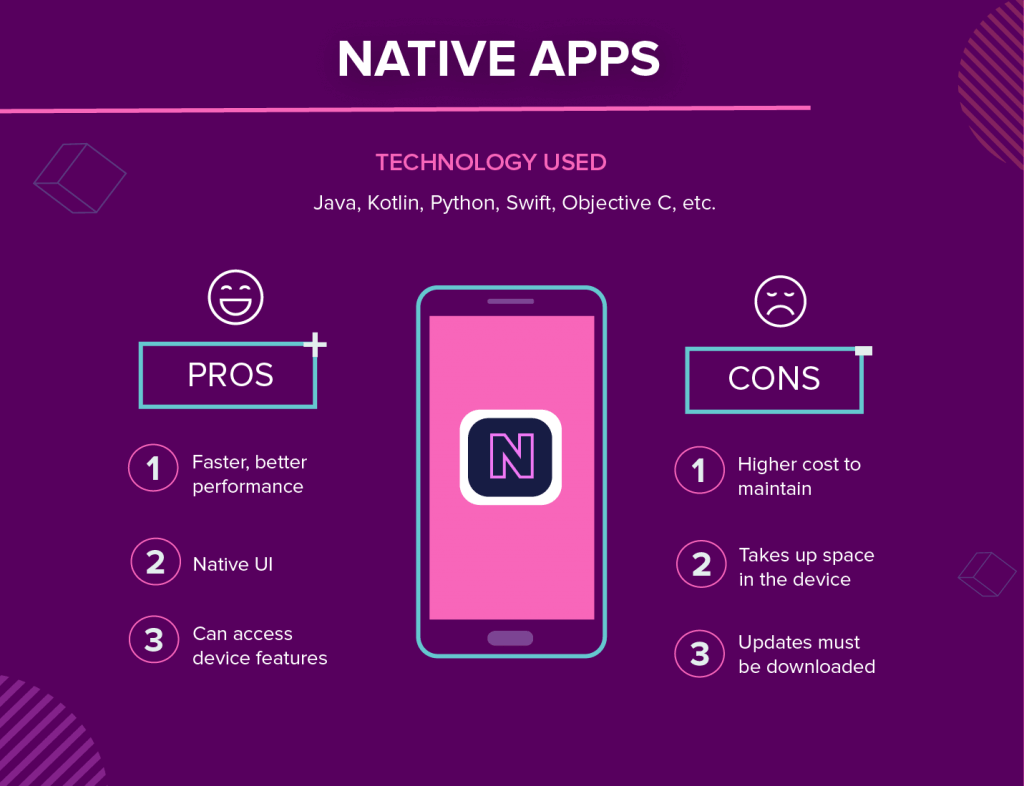


In Native application the language that be written specific language depend on the operating system that been developed for primarily, that has been Java for Android platform would be android studio, for IOS used language of objective-c and swift by using Xcode platform.
However, these languages are currently being replaced by Kotlin or Android studio (Android) and Swift (iOS) due to comprehensive platform growth. In terms of the look and feel of your application, if you want to have the best user interface possible, then native app creation might be a good choice.
Since users are easy to get familiar with how to do it as an interface closely matches the rules for popular platforms. There are also other explanations that might be much more compelling:
Native applications work much faster than non-native apps since written in languages entirely adopted by the ecosystems of the web. It also seem to run more efficiently because it have access to proprietary APIs and modules tailored for varying screen sizes and iterations of the device.
Many separate levels of an operating system are covered by native, which makes them impossible to hack. Native frameworks often do not rely on any third-party frameworks, utilising only official APIs that have been extensively checked through multiple iterations of the system.
At last, official updates of the platform often occur less often than releases of the system. User can expect more stable, well-tested, and consistent applications with longer release cycles. Shorter update times, with the option of having patched later, can be less fully planned due to lack of time.
There are a few of experienced programmers working on the growth of native applications. The programmer has experienced due to many years of invaluable, all programmers know the IOS system and Android very deeply, because of this situation, the programmer capable to solve the various type of problems occurs due development stage.
When it comes to technical, UX and UI solutions, the programmers will also guide to help users get the best available experience that is also suited to the platform.
Native projects are easier to customise since only one framework must be compliant with them. it’s totally independent, even though there are two native projects, meaning developer do not have to think about the consistency of software dependencies between versions for different platforms (Android, iOS) and can use some new features freely on a specific platform.
The fewer limitations there are, the smoother it is to scale. If wish to incorporate the advantages of both cross-platform and native implementations, you might want to start natively, and then apply additional cross-platform code to any of the app's smaller modules. This is a stable approach used by some of the market's leading competitors, such as Facebook and AirBnB.
All the hardware capabilities of a mobile computer can be completely used by native users. Moreover, thanks to the unique APIs supported by Google and Apple operating systems, their installation is fast and simple.
Android and iOS, respectively, are Google and Apple 's signature devices. They are extremely unlikely to unexpectedly withdraw their enthusiasm for these ventures. Being completely sponsored by platforms from these technological giants ensures that both servicing and growth are certainly much more stable. Device functions such as application shortcuts or biometric APIs may be automatically introduced in native applications as soon as they are released.
Inside a defined platform, UX / UI is centralised, so users already know it well. In most native applications, the UX patterns recur, but users can intuitively know how to navigate around in your software as well.
The user interface is also much improved because the higher efficiency helps it to run seamlessly. When designing and developing an app, it is easier for the developers to meet the imposed requirements. Platform-specific functionality may be built directly inside a native app, such as Google Pay or Siri integration.
Here are some of top company that used native application:
Fantastic results, cost-efficiency, reliability and the opportunity to reach the stars-choosing to go with native app creation might sound like hitting the bull 's eye if you've already chosen to build a mobile app.